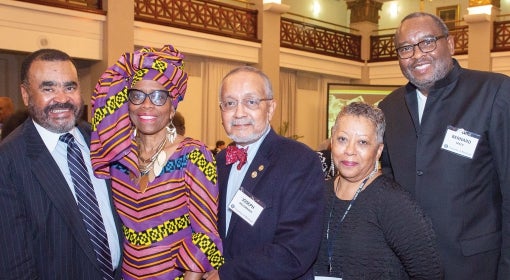The traffic in Los Angeles was at a standstill, but inside George Allen Bivins’s car, the radio dial spun. He was searching the airwaves for something to help pass the time, skipping through static until he landed on the popular hip-hop station KDAY. A new track was playing that he had never heard before. The beat was catchy, but the verses captivated Bivins, making the crowded highway around him melt away.
The song, by rapper Ice Cube, is an ode to fallen friends.
As Bivins listened, he heard a firsthand account of how violence entraps and kills young Black men. Behind the words’ bravado was a tale of street life that traverses politics, faith, and loss. It’s a story of trauma, addiction, hope despite narrow odds, and the tensions between family patterns and peace and unity.
The year was 1990 and, while Bivins knew hip-hop music well, Ice Cube’s song had a depth that surprised him. It was more than the typical dance party track. As he continued to think about the lyrics, the Pitt alumnus was struck by the power the words held, the way they shared experiences that were otherwise unrepresented in music and much of popular culture. He became inspired.
That listening experience would help to transform Bivins, pushing him toward his life’s passion and an influential career working with some of the top names in music, including Usher, Alicia Keys, and the Notorious B.I.G. Today, as the executive vice president of music promotions at RCA, part of one of the world’s largest entertainment companies, he’s guiding Pitt students in his footsteps.
Even as a young man, music pulsed through Bivins every day. The sounds of soul, funk, or jazz spun away on turntables or crackled through radio speakers. He danced weekend nights away, grooving to the latest music at neighborhood community centers. He haunted record stores. Music was his North Star, leading him in search of the freshest sounds and newest artists.
At the time, however, there was no roadmap to show the mill worker’s son how to make the leap from North Versailles, a rustbelt township southeast of Pittsburgh, to a successful career in the music business. He wasn’t a singer or a musician. Breaking into the industry just didn’t seem like an option. But Bivins was a bright student, hardworking and driven. He didn’t want to follow his father and uncle into the mills.
So, he attended the University of Pittsburgh, where he majored in business and excelled in accounting and economics.
“Data and policy seemed like the logical way to break through the blue-collar roots,” he recalls.
Still, every chance he got during undergraduate life at Pitt, Bivins hurried toward the music.
After graduating, he enrolled at Carnegie Mellon University, where he earned a master’s degree after studying public affairs and data analysis. To celebrate his academic accomplishments, his proud family bought him a roundtrip ticket to Los Angeles.
The West Coast enthralled Bivins. He basked in the warmth of the Pacific sun, the breezy nightclub scene, the vibrant music, and decided to stay. For nearly a decade, he hopscotched across L.A., working in accounting, computer programming, and data analysis. Eventually, he was hired at Music Corporation of America (MCA) as an information systems auditor. It was a small opening into the music industry he loved and, as a bonus, he got to work in Europe for three months at a time.
By all accounts, the businessman was highly accomplished. But by his early 30s, he was chafing at the mounting hours he spent behind a desk. He felt unsatisfied. Music, however, still had the ability to fill him up, to invigorate him.
That’s when he heard Ice Cube’s track, “Dead Homiez,” and tapped into the rhythms and blues of an under-heard urban culture. The song was released during a time of escalating violence and racial tension in Los Angeles. The strain between the Black community and the police would eventually explode, leading to the 1992 Los Angeles riots.
 “It was like Ice Cube was a social commentator, talking about problems that, you know, you didn’t hear about on the news,” says Bivins. “With the L.A. news, you might hear about a shooting. But you don’t hear about it from the perspective of the Black person, the people who are being shot. And that’s what intrigued me so much. It’s like there’s a different story. It’s the story they’re telling on the street in Compton and South Central.”
“It was like Ice Cube was a social commentator, talking about problems that, you know, you didn’t hear about on the news,” says Bivins. “With the L.A. news, you might hear about a shooting. But you don’t hear about it from the perspective of the Black person, the people who are being shot. And that’s what intrigued me so much. It’s like there’s a different story. It’s the story they’re telling on the street in Compton and South Central.”
He felt more driven than ever to pursue a career that would allow him to help amplify the voices behind these stories—a career in music promotions. Why not? He was still buying records, enjoying the clubs, going to concerts, doing what just seemed natural. “Wow,” he remembers saying to himself. “Why don’t you do something that you like instead of something you just get paid for?”
Bivins already knew how to excel in business: learn your stuff, work hard, and build a reputation. What would follow would be years of hustle as the former auditor learned the ins and outs of music promotions and honed his ability to identify artists whose work would most connect with the public.
Confident in his ear for talent, he earned a side gig writing music and concert reviews for Urb, an L.A. music and culture magazine. His work put him in tune with the local music scene and he soon started his own promotions company, through which he worked to get artists’ music into the hands of listeners. He focused on hip-hop, a genre that encompasses the social, artistic, and political elements that grew from the youth culture and streets of New York City.
At first, says Bivins, some record executives worried that he was too old, too educated, and not “hip” enough to reach the rap generation. But he kept pounding the pavement and trolling the airwaves, all the while juggling his day job. After a year, his hard work paid off: he left his job and took an internship at MCA in its urban music promotions department. George Bivins transformed into “Geo,” a cooler version of his old self.
No longer stuck behind a desk, he became an urban pied piper, getting people to follow him to the newest sounds. With unstoppable energy, he hit barbershops, hair salons, and gyms, passing out cassettes and vinyl records of the latest MCA artists. But his work entailed more than distributing music to the right places—he had to become a scholar of what tracks most appeal to which audiences. He sometimes visited three clubs a night, seven days a week.
“I’d then stand back and just watch the crowd, see what the reaction was. I would actually have to put that on a report to the record label.”
He’d rank the reaction based on the crowd’s activity. An empty dance floor earned a one. If people danced and packed the floor, the reaction earned a higher ranking. It was a measure to the company of how strongly to promote a musician, and soon, Bivins built a strong sense of which artists would get the crowd going.
He knew he was hearing something special in the summer of 1993, when the recently minted music industry-insider first listened to what would become the debut album of 21-year-old Brooklyn rapper Christopher G. Wallace. By then, Bivins’s MCA internship had ended, and he was working with his own promotions company. The brilliant, complicated Wallace, also known as the Notorious B.I.G. or Biggie Smalls, had crafted a searing series of autobiographical tracks that made up his record, Ready to Die. It would become one of the top-selling rap albums of all time—thanks, in part, to the promotional efforts of Bivins, who helped the East Coast rapper go national by gaining fresh appeal on the West Coast.
“Working with Biggie was a pivotal moment in my career,” he says.
Because Biggie was such a sensation, music insiders wanted to know which L.A.-based street company had launched the multiplatinum artist. When they came looking, they found Bivins. His rising star gave him the opportunity to magnify the voices of other artists.
He would go on to team up with Jive Records, where he worked with artists like influential rapper KRS-One and R&B singer Aaliyah. After a stint at Capitol Records, Bivins landed at RCA in New York City, where today he is executive vice president of music promotions and has helped to elevate the careers of artists including Alicia Keys, Usher, Bryson Tiller, H.E.R., A$AP Rocky, and SZA.
When she enrolled at Pitt in 2014, Michelle Ruoff’s goal was to find a path into the music business. Like Bivins, the young woman from western Pennsylvania’s Westmoreland County led a life punctuated by tunes. Everywhere she went, she carried hours of music—Ariana Grande, Beyoncé, Rihanna, Nicki Minaj, and others—on her smartphone. To Ruoff, songs can be more than just something to listen to.
“It is a way to talk about different experiences,” she says. “Not all knowledge comes from the mainstream, and music becomes a way to learn and get different glimpses of people and find understanding.”
She wanted to be a part of that work. As a first-year, she decided to double major in communication and business, spending her free time producing and organizing concerts with the Pitt Program Council. As a sophomore, she collaborated with a local female rapper and artist, creating social media plans, improving the musician’s Web site, and coordinating gigs and media.
 Then, one evening in her junior year, while attending a meeting of her honor society, she heard about an exciting new music industry internship—a chance to work at RCA in New York City. She applied immediately.
Then, one evening in her junior year, while attending a meeting of her honor society, she heard about an exciting new music industry internship—a chance to work at RCA in New York City. She applied immediately.
Bivins (BUS ’82) had recently created the Geo A. Bivins Jr. Internship Award, open every other year to a rising Pitt junior or senior, to give students at his alma mater an inroad to their dreams.
“I want to let kids in Pittsburgh know that there’s a business of music,” he says. “If you buy tickets, spend a lot of your time listening to music, there’s a business out there: there’s accounting, there’s finance, there’s video production, there’s music production. There are so many areas that you can get into.”
“The music industry is difficult to break into, so this opportunity is invaluable,” says Cheryl Finlay, associate dean of students and director of Pitt’s Career Center, which emphasizes experiential learning to help prepare students for successful professional lives beyond college.
As an applicant, Ruoff’s passion and initiative impressed Bivins. She landed the internship and was assigned to the digital marketing team. In the summer of 2017 she found herself on New York’s bustling Madison Avenue feeling like she was at the center of the music universe.
Through her work with RCA, Ruoff was given a broad view of the music business and life beyond college. She says she became a “more knowledgeable, understanding, and considerate” person, able to recognize herself as a singular global citizen. The internship stimulated her creativity and confidence and prepped her for the position she has now that she’s graduated, working with a Pittsburgh-based Internet radio platform where she writes music news, announcements, and more. It initiated her into the modern world of music and promotions—a world Bivins knows well.
The genre was rapidly expanding when Bivins first began promoting hip-hop. Over the past 30 years, he’s watched as hip-hop has become one of the biggest music genres in the United States, a globally influential social, political, cultural, and artistic movement. Many members of its growing audience connect to the music for the same reasons that first drew in Bivins—its ability to give voice to the frustrations and experiences of African Americans and others.
“Hip-hop is everywhere,” he explains. The genre generates more than $10 billion per year and influences film, fashion, and television. It continues to cross boundaries. Last spring, Kendrick Lamar became the first rapper awarded a Pulitzer Prize in music, lauded for the ideas and social justice commentary entrenched in his music.
The rise is also driven by streaming and other new technologies, Bivins says. Listeners are no longer tethered to radios or record players, as he once was as a Pitt student. They can click into the music as often as they like, which, he says, provides them a chance to “really hear” the lyrics and their meanings. When they do, they come to care about the stories and the people behind them. With his help, the next generation of industry insiders will soon bring important new voices to earbuds around the world.
But Bivins has long been tuned to hip-hop’s intellectual, intersectional dimensions.
“The artists say what they want,” he says. “And I get the world to come take a listen.”
Opening image: Geo Bivins in New York City
This article appeared in the Winter 2019 issue of Pitt Magazine.





